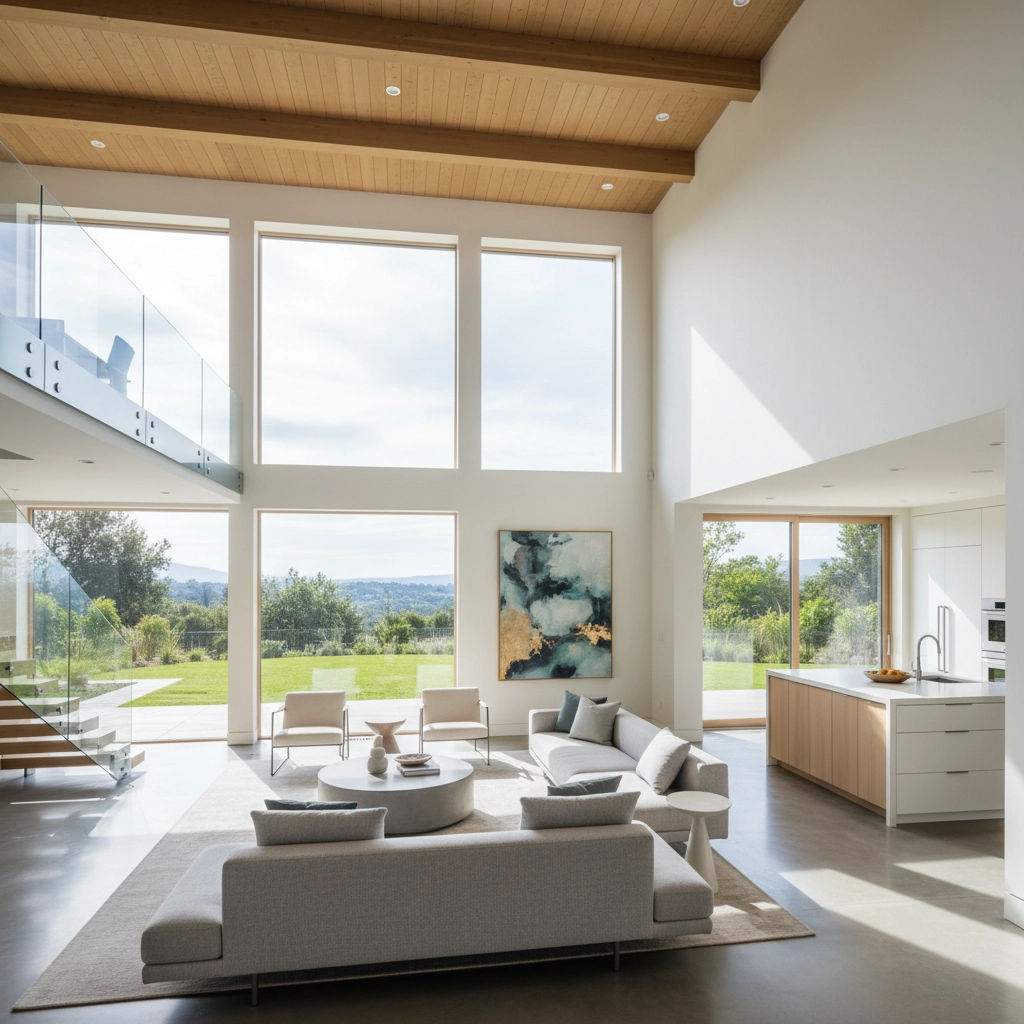If you've been house hunting lately, you've probably felt the frustration of competing against well-funded…
Time to Upgrade: Tips for Buying a Bigger Home
Ready to spread your wings? If you're feeling cramped in your current home or dreaming of that extra bedroom, home office, or bigger backyard, you're not alone. Upgrading to a larger home is one of the most exciting, and nerve-wracking, decisions you'll make as a homeowner. But here's the thing: with the right planning and timing, it can also be one of the most rewarding.
Whether you're a growing family bursting at the seams or simply ready for more breathing room, upgrading your home is about more than just square footage. It's about creating space for your life to unfold comfortably. Let's walk through everything you need to know to make your bigger home dreams a reality.
When Is the Right Time to Upgrade?
Timing can make or break your home upgrade strategy. The sweet spot for upgrading typically falls during the second or third year of a real estate down cycle. Real estate markets historically move in seven-to-ten year up cycles followed by shorter one-to-three year corrections, so understanding these patterns can save you serious money.
Here's a pro tip: the optimal time to buy is approximately 18 months after a market peak. Why? It takes about six months to confirm we've actually hit the peak, then another 12 months for prices to soften meaningfully. Based on recent market patterns, with April 2022 marking the peak in home prices, we're looking at 2025-2026 as potentially ideal timing for upgrades.
But market timing isn't everything. Your personal circumstances matter just as much. If mortgage rates are expected to drop (hello, Fed rate cuts!), that's another green light. Lower rates mean more buying power for your dollar, which is exactly what you want when upgrading to a pricier home.
Seasonally speaking, summer and winter months often present the best opportunities. Sellers in July, August, December, and January tend to be more motivated, which can translate to better deals for you.
Signs You're Ready for More Space
Let's be real, you probably already know if you need more space. But sometimes it helps to see it spelled out. Here are the telltale signs that it's time to start house hunting:
Growing Family Needs: This is the big one. Whether you're expecting another little one or your current kids are outgrowing shared bedrooms, family growth is the most common catalyst for upgrading. And honestly, it's a beautiful problem to have.
Storage Overload: If you've Marie Kondo-ed your way through every closet, invested in every storage solution Pinterest has to offer, and you're still drowning in stuff, your home might simply be too small for your lifestyle.
Clutter Chaos: When belongings start interfering with your home's basic functions, can't cook because the kitchen's too cramped, can't relax because there's nowhere to put anything, that's your house telling you it's time to level up.
Work-From-Home Reality: The pandemic changed everything about how we use our homes. If you're still taking Zoom calls from your bedroom or trying to concentrate while the kids do homework at the same kitchen table, a dedicated office space isn't a luxury, it's a necessity.
Renovation Fatigue: Considering a major addition or renovation? Sometimes it makes more financial and sanity-preserving sense to put that money toward a bigger, newer home instead.
Financial Planning for Your Upgrade
Here's where the rubber meets the road. Upgrading to a bigger home isn't just about qualifying for a larger mortgage, it's about preparing for the total cost of ownership increase that comes with more space.
Budget Beyond the Mortgage: Your monthly housing costs will jump, and not just from a bigger mortgage payment. Property taxes, homeowners insurance, utilities, and maintenance all scale up with home size. That roof replacement? It costs a lot more on a 4,000 square foot house than a 2,000 square footer.
Income Stability Check: Lenders will verify your income, but you need to honestly assess your earning stability. Can your household income handle not just today's higher costs, but potential future expenses? Factor in some buffer room, life has a way of throwing curveballs.
Consider the Rental Route: Here's a strategy many people overlook: instead of selling your current home, consider keeping it as a rental property if you can swing it financially. Real estate tends to appreciate over time, and rental income can provide a nice wealth-building opportunity. Plus, you'll have a backup plan if your upgrade doesn't work out as expected.
Down Payment Strategy: You might be able to tap into your current home's equity for the down payment on your upgrade, but make sure you understand the timing and logistics. Bridge loans or home equity lines of credit can help, but they come with their own risks and costs.
What to Look for in Your New Home
Shopping for a bigger home is exciting, but don't let the extra square footage blind you to practical considerations. Here's what smart upgraders focus on:
Layout Over Size: A well-designed 2,500 square foot home can feel more spacious and functional than a poorly laid out 3,500 square foot house. Look for logical flow, good natural light, and spaces that serve multiple purposes.
Future-Proofing Features: Think about how your needs might change. Bedrooms on the same floor work great for families with young kids. A main-floor bedroom and bathroom become valuable as you age. A basement or bonus room can adapt to changing needs over the years.
Outdoor Space: Don't forget about the yard! Kids, pets, and adults all benefit from outdoor space. Even if you're not a gardener now, you might appreciate having the option later.
School Districts: Even if you don't have school-age children currently, good school districts protect your investment. Homes in desirable school zones tend to hold their value better and sell faster.
Maintenance Reality: Bigger homes require more maintenance. That impressive two-story foyer looks great, but consider the cost and hassle of painting it. Multiple HVAC systems, larger roofs, more windows, it all adds up.
Benefits of Making the Move
Let's talk about why upgrading can be one of the best decisions you'll make. Beyond the obvious space benefits, a larger home can:
Improve Quality of Life: Having enough space for everyone and everything reduces daily stress. Kids can play without tripping over your work equipment. You can have guests without turning your living room into a guest room.
Build Long-term Wealth: Real estate has historically been one of the best wealth-building tools for middle-class families. Trading up to a more valuable property can accelerate that process, especially if you're moving to a neighborhood with strong appreciation potential.
Enable New Experiences: That bigger kitchen might inspire more family cooking and entertaining. The home office could launch a side business. Extra bedrooms mean houseguests and family visits become easier and more enjoyable.
Create Breathing Room: Sometimes you don't realize how cramped you felt until you have space to stretch out. Mental health benefits of comfortable living space are real and significant.
Getting Started with Your Upgrade
Ready to take the plunge? Here's your action plan:
First, get pre-approved for your new mortgage amount. This isn't just about knowing what you qualify for, it shows sellers you're serious and can close quickly. At Affinity Group Mortgage, we can help you understand exactly what you qualify for and explore different loan options that might work for your situation.
Next, honestly assess your current home's value and condition. You'll need this information whether you're selling or keeping it as a rental. Consider getting a professional appraisal or at least a comparative market analysis from a trusted realtor.
Finally, start looking at homes with a clear priority list. What's must-have versus nice-to-have? What neighborhoods offer the best value? What compromises are you willing to make?
Upgrading to a bigger home represents growth, in your family, your wealth, and your comfort. Yes, it requires careful planning and financial preparation, but for most people, the benefits far outweigh the temporary stress of moving and adjusting to higher expenses.
Remember, you don't have to navigate this process alone. Whether you need help understanding your financing options, calculating what you can afford, or exploring different loan programs, the team at Affinity Group Mortgage is here to guide you through every step of your upgrade journey.
Your bigger, better home is waiting( let's make it happen.)







